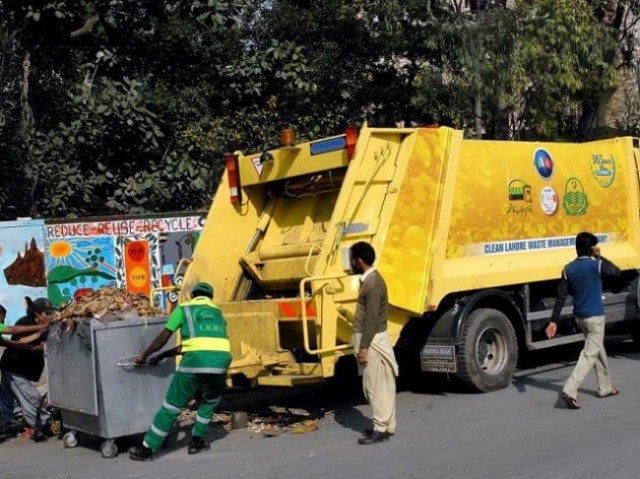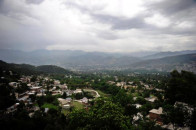Cabinet rolls out first policy to tackle hazardous waste
Islamabad to have NAP implementation framework in three months to handle country’s 30m tonnes of annual waste

The federal cabinet approved on Tuesday country’s first-ever National Hazardous Waste Management Policy, 2022, hoping that the Centre and provinces would finalise a National Action Plan (NAP) implementation framework of the policy within three months so that the country does not become a dumping ground of hazardous disposals.
Minister for Climate Change Senator Sherry Rehman said that the cabinet has approved the strengthening of classification, transparency, institutional and NAP implementation frameworks and more stringent governance infrastructure for regulation of hazardous waste in the country and at its international borders.
The decision has been taken as Pakistan annually produces 30 million tonnes of waste in addition to annually importing 80,000 tonnage of bundled waste from around the world, which has been causing environmental and health problems as well as contaminating the surface water and groundwater supplies.
Also read: Hazardous pandemic medical waste piles up
“Before Pakistan becomes a dumping ground for our own and the world’s hazardous waste, the government has gone ahead and made a detailed national policy to manage hazardous waste,” the climate change minister said in a press briefing held after the cabinet meeting, chaired by Prime Minister Shehbaz Sharif.
Minister for Information and Broadcasting Marriyum Aurangzeb and Adviser to PM for Kashmir and G-B Qamar Zaman Kaira among others shared other key decisions taken in the cabinet meeting, including approval of the visa regime for Afghanistan, housing scheme for Kashmiri refugees and an increase in the Hajj quota.
Waste Management Policy
Terming the approval of the policy a milestone, the climate change minister said that the implementation of the policy would help protecting health of the people and country’s environment.
“The mismanagement of hazardous waste materials has become a serious challenge for Pakistan,” Sherry said, adding that “Our country has been importing all kinds of bundled waste from different parts of the world with an average annual tonnage of 80,000”.
“If we are unable to manage our hazardous-waste storage and proper recycling then our own 30 million tonnes of waste every year without adequate disposal will contaminate both our surface water and groundwater supplies and can also wind up as a source of dangerous land pollution,” the minister feared.
She noted that the country’s far and few landfills were usually up to their capacity and could not afford further dumping.
The minister observed that the government had devised a long-overdue policy, saying “the country needed to get serious about managing waste, separating it as well as tracking it, instead of the unscientific and unregulated manner it has been handled over the years”.
Also read: Hospital waste dumped openly on road
“The collection, treatment, and disposal of waste material have been causing significant harm to human health and the environment.”
The senator said the policy promotes a life cycle approach to manage hazardous waste from its generation to disposal in a manner that does not harm the environment.
Moreover, as Pakistan shifts toward an industrial-driven economy, she said, there was a higher likelihood of dumping of hazardous waste and poor management.
“Such wastes can potentially cause serious damage due to inadequate storage, transportation, treatment, or disposal operations,” the minister said, adding that studies have suggested that illegal or poor waste management is the most important worldwide cause of contamination of soil and groundwater.
Sherry while referring to electronic waste (e-waste) – electronic products nearing the end of their useful life – said they contain recognised hazardous substances that may be directly released or generated after disposal or during the recycling process.
“They pose life-threatening health risks for local communities that import the waste illegally,” she said, adding “there is a risk for adverse pregnancy outcomes i.e. low birth weight, total birth defects, and effects on the central nervous system of the baby”.
Moreover, she said, e-waste can cause breathing problems, irritate skin or eyes, and cause headaches or nausea. “Pakistan has illegal dumping sites littered all over its cities near residential areas that pose a serious health risk for its citizens,” she said.
Also read: Sustainable solid waste management
Emphasising on a united front with federal and provincial governments working together to protect environment and people, the minister said that consultations with the provinces and AJK and G-B was completed and a specialised directorate for managing hazardous waste would be established in the ministry to implement the policy.
She stressed the importance of compliance with the Basel, Stockholm, Rotterdam, and Minamata conventions. She said that without a proper channel, awareness, or a policy in place the country would face a hazardous waste problem that would be too difficult to control.
The premier lauded the minister’s efforts for environmental protection, saying he would soon convene a special meeting on environmental protection where the provincial governments would also be invited.
Cabinet approves visa regime for Afghanistan
Meanwhile, the federal cabinet through the Afghan Inter-Ministerial Coordination Cell reviewed and approved the visa regime for Afghanistan after a meeting of an apex committee of NADRA, Board of Investment (BOI) and Foreign Office.
Following the approval, the information minister said that the visa applications received from Afghanistan at foreign offices and embassies in Pakistan will be processed on the basis of current nationality and passport instead of country of origin.
The information minister said that the federal cabinet has included sub-categories in the work visa category to maximise trade with Afghanistan. In the category, she said, the proposal to introduce drivers, transporters and helpers within the online visa system was approved.
Also read: PM Shehbaz gives nod to new transit visas for Afghans
Multiple entry visas based on a six-month period will be issued within 48 hours, Marriyum said, adding the interior ministry could extend it to one year.
The cabinet exempted drivers, transporters and helpers from getting a letter of recommendation from the BOI and registration of SECP, saying NADRA has been directed to ensure that changes were immediately made in the online system.
The premier also formed a cabinet committee to continue monitoring the business facilitation process and to ensure that visa requirements for patients coming from Afghanistan on medical grounds had been made easy.
Housing scheme for Kashmiri refugees
Adviser to the PM for Kashmir and G-B Qamar Zaman Kaira said that the cabinet has given approval for the release of Rs3.1 billion for the first phase of construction of 1,314 houses for the Kashmiri refugees, who had migrated to Pakistan from Indian Illegally Occupied Jammu and Kashmir due to fighting some three decades ago.
Kaira said that the housing scheme was being set up for 8,000 Kashmiri families, adding that the AJK government has to provide land for the purpose.
Increase in Hajj quota
The cabinet approved amendments to the Hajj Policy 2022 on the recommendation of the Ministry of Religious Affairs as a result of the problems encountered in the ongoing operations for the pilgrimage.
Under these amendments and on the directions of the Peshawar High Court, 188 private sector pending cases and the quota of additional 2,000 pilgrims received from Saudi Arabia were made part of the government Hajj scheme. The number of government quotas was increased to 34,641 from 32,453.
Balochistan quota
The cabinet was briefed on the vacant posts in the federal services regarding Balochistan quota before it approved that the ministries and divisions would ensure that recruitment on provincial quota was based on merit and that the domicile rights of the region were not violated.
It said that an NOC would be obtained from the Establishment Division for recruitment on Balochistan quota within two weeks and advertisements will be given for all vacancies.
Attack on polio team condemned
The cabinet condemned attack on polio team in district Tank, which left a polio worker and two constables accompanying the team in North Waziristan dead.
The information minister said that the PM has directed the interior minister to submit a report before the cabinet in the next meeting.



















COMMENTS
Comments are moderated and generally will be posted if they are on-topic and not abusive.
For more information, please see our Comments FAQ